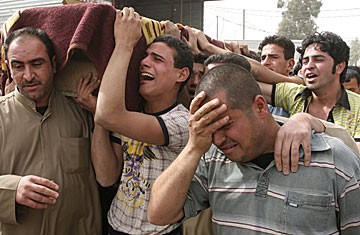
Baghdadis carry the coffin of a victim killed in a bomb attack at the city's main police academy in Baghdad.
Violence in Baghdad has dropped off markedly in the past year, but despite the calm days, it's clear that the capital has not entered a post-war phase.
Sunday's suicide attack by a bomber wearing an explosives belt and driving an explosives-laden motorcycle killed at least 28 people and wounded at least 57. It was directed at a familiar target — recruits at the Police Academy in central Baghdad, the same facility that was attacked Dec. 1 in a double bombing that killed 15 and wounded almost 50. (See photos of prison life inside Baghdad's Camp Cropper)
The brazen strike in a fortified part of the capital near the Interior and Oil ministries and other government offices took place just hours before Major General David Perkins, spokesman for U.S forces in Iraq, said that American troops would be pared down from 14 to 12 brigades by September, reducing the 140,000-strong force by 12,000. President Barack Obama plans to withdraw all combat troops by September next year, leaving a residual force of up to 50,000 support and training troops. Four thousand British troops are also scheduled to pull out in the next few months.
Although violence is down to levels not seen since August 2003, Iraq remains a dangerous, combustible place — and there's been an uptick in violence in recent weeks. Some 258 Iraqis were killed in February, a 35% increase over January's total of 191, which was the lowest figure since 2003, according to government statistics. On Thursday a car bombing at a livestock market in Hilla, south of Baghdad, left 12 people dead. Meanwhile, American and Iraqi security forces continue to try to rout out the remnants of Al-Qaeda in the restive northern city of Mosul and in the northeastern Diyala province.
"We are by no means complacent.," Perkins told a press conference on Sunday. "We know that Al-Qaeda, although greatly reduced in capability and numbers, still is desperate to maintain relevance here in Iraq."
Ali al-Dabbagh, the government spokesman, told the same press conference that "what happened today will not undermine overall security improvements." But Iraq is by no means out of the woods. Increasingly acrimonious divisions between Prime Minister Nouri al-Maliki and his expanding list of political rivals could deepen as the national elections slated for December approach. The temperature of intra-sectarian politics, between rival Shi'ite and Sunni groups respectively, is also bound to rise in the coming months. Although January's provincial elections went off without a hitch, there's more at stake in the national polls, which will determine the next parliament and government. They'll also be a crucial test of whether Iraqis will have put their bloody past behind them and are able to resolve their differences through votes instead of violence.
